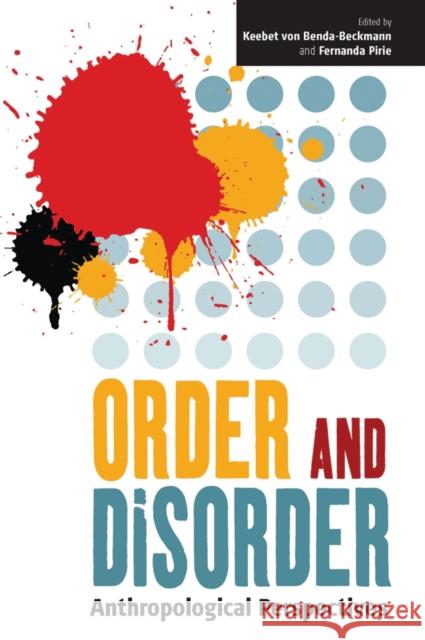Order and Disorder: Anthropological Perspectives » książka
Order and Disorder: Anthropological Perspectives
ISBN-13: 9780857451484 / Angielski / Miękka / 2011 / 184 str.
Order and Disorder: Anthropological Perspectives
ISBN-13: 9780857451484 / Angielski / Miękka / 2011 / 184 str.
(netto: 113,53 VAT: 5%)
Najniższa cena z 30 dni: 115,87
ok. 30 dni roboczych.
Darmowa dostawa!
..".the ethnographies...are rich, nuanced and highly readable." - Anthropological Notebooks Disorder and instability are matters of continuing public concern. Terrorism, as a threat to global order, has been added to preoccupations with political unrest, deviance and crime. Such considerations have prompted the return to the classic anthropological issues of order and disorder. Examining order within the political and legal spheres and in contrasting local settings, the papers in this volume highlight its complex and contested nature. Elaborate displays of order seem necessary to legitimate the institutionalization of violence by military and legal establishments, yet violent behaviour can be incorporated into the social order by the development of boundaries, rituals and established processes of conflict resolution. Order is said to depend upon justice, yet injustice legitimates disruptive protest. Case studies from Siberia, India, Indonesia, Tibet, West Africa, Morocco and the Ottoman Empire show that local responses are often inconsistent in their valorization, acceptance and condemnation of disorder. Keebet von Benda-Beckmann is head of the project group 'Legal Pluralism' at the Max Planck Institute for Social Anthropology at Halle, Germany. She is Professor of Anthropology of Law at Erasmus University Rotterdam and Honorary Professor at the universities of Leipzig and Halle. Her research focuses on legal pluralism, disputing, decentralization, social security and natural resources in Indonesia and the Netherlands. Publications include Changing Properties of Property, co-edited with Franz von Benda-Beckmann and Melanie Wiber (Berghahn 2006). Fernanda Pirie is Lecturer in Socio-Legal Studies at the University of Oxford. She has carried out research into conflict and its resolution in both Ladakh and among the nomads of Amdo in eastern Tibet. Her writings focus on order and disorder and the relations between law and religion. She is the author of the forthcoming Peace and conflict in Ladakh: the construction of a fragile web of order (Brill 2006).
"...the ethnographies...are rich, nuanced and highly readable." · Anthropological NotebooksDisorder and instability are matters of continuing public concern. Terrorism, as a threat to global order, has been added to preoccupations with political unrest, deviance and crime. Such considerations have prompted the return to the classic anthropological issues of order and disorder. Examining order within the political and legal spheres and in contrasting local settings, the papers in this volume highlight its complex and contested nature. Elaborate displays of order seem necessary to legitimate the institutionalization of violence by military and legal establishments, yet violent behaviour can be incorporated into the social order by the development of boundaries, rituals and established processes of conflict resolution. Order is said to depend upon justice, yet injustice legitimates disruptive protest. Case studies from Siberia, India, Indonesia, Tibet, West Africa, Morocco and the Ottoman Empire show that local responses are often inconsistent in their valorization, acceptance and condemnation of disorder.Keebet von Benda-Beckmann is head of the project group Legal Pluralism at the Max Planck Institute for Social Anthropology at Halle, Germany. She is Professor of Anthropology of Law at Erasmus University Rotterdam and Honorary Professor at the universities of Leipzig and Halle. Her research focuses on legal pluralism, disputing, decentralization, social security and natural resources in Indonesia and the Netherlands. Publications include Changing Properties of Property, co-edited with Franz von Benda-Beckmann and Melanie Wiber (Berghahn 2006).Fernanda Pirie is Lecturer in Socio-Legal Studies at the University of Oxford. She has carried out research into conflict and its resolution in both Ladakh and among the nomads of Amdo in eastern Tibet. Her writings focus on order and disorder and the relations between law and religion. She is the author of the forthcoming Peace and conflict in Ladakh: the construction of a fragile web of order (Brill 2006).











